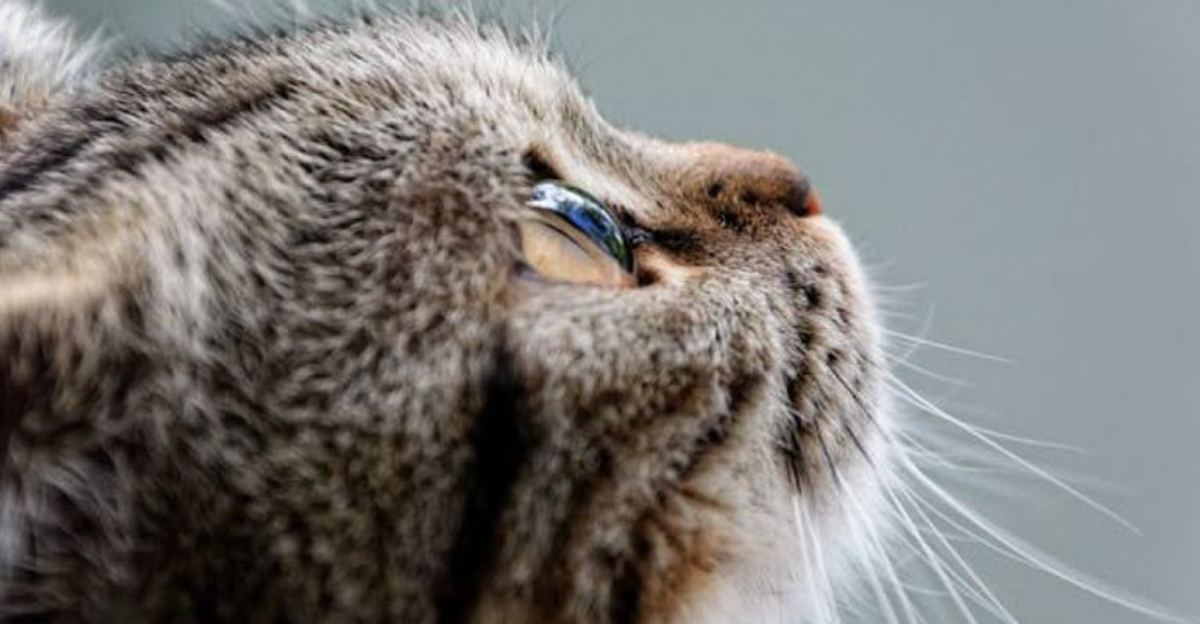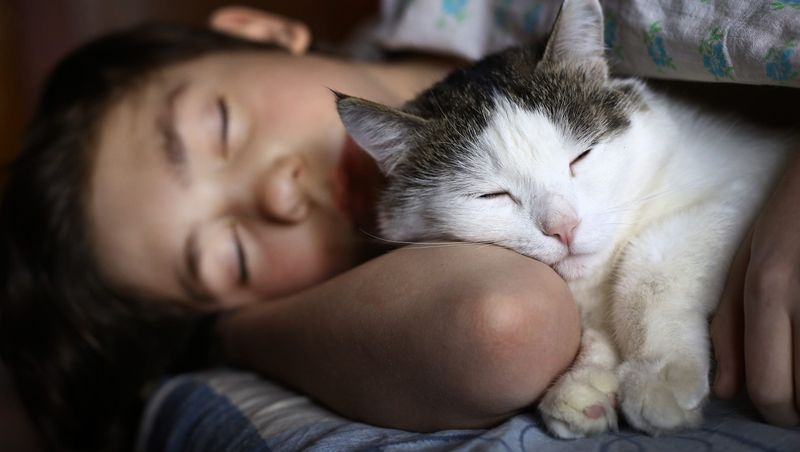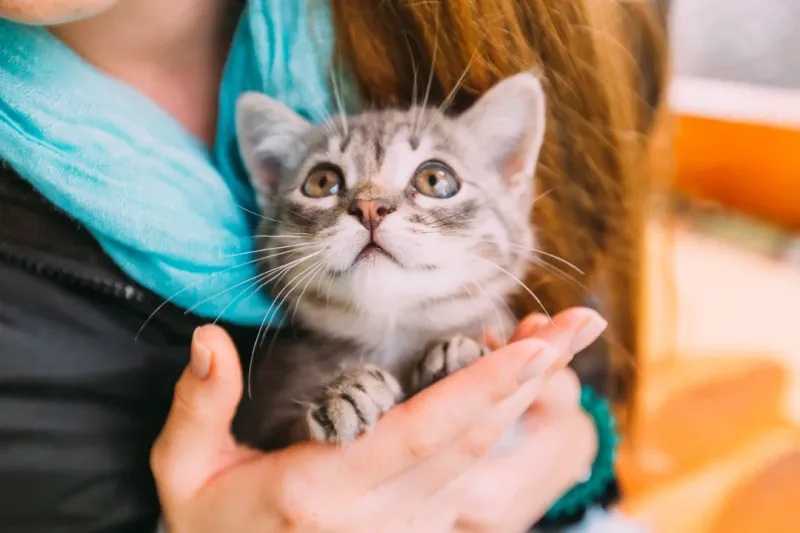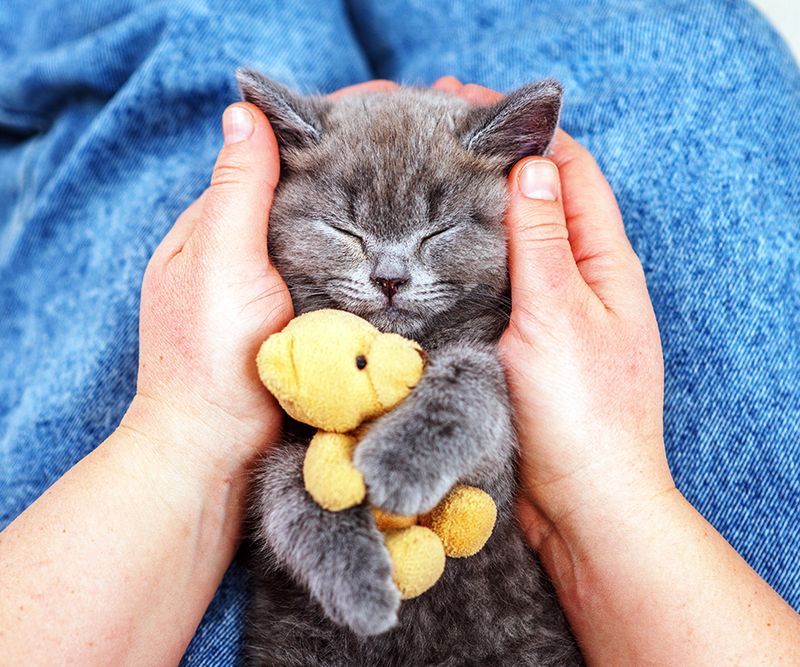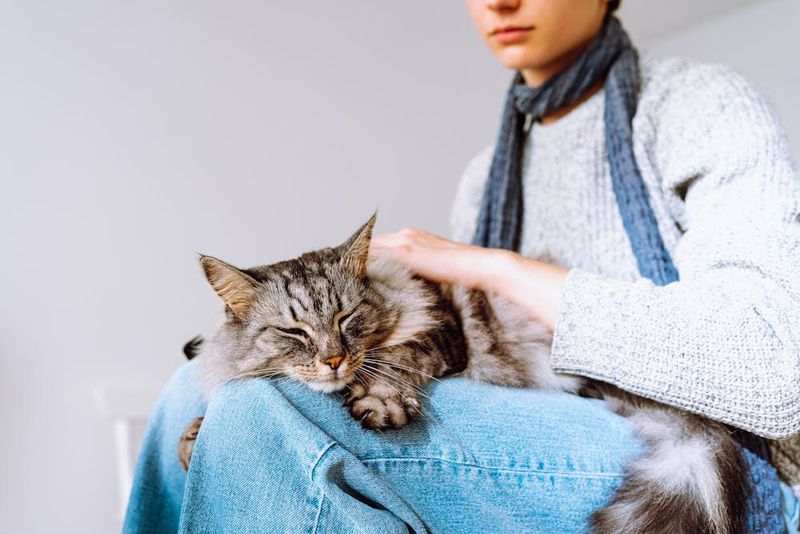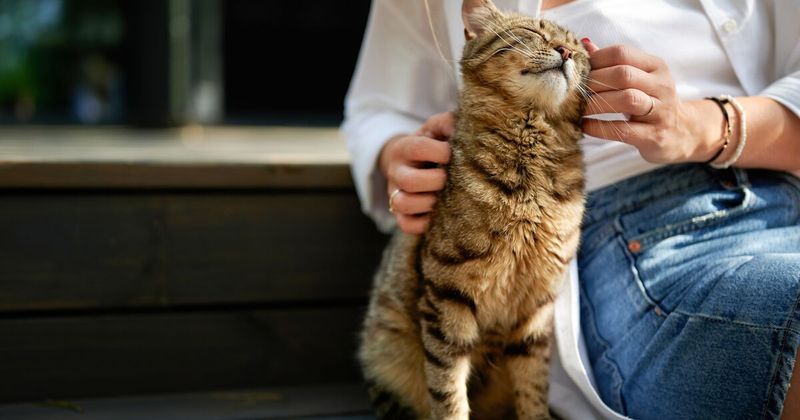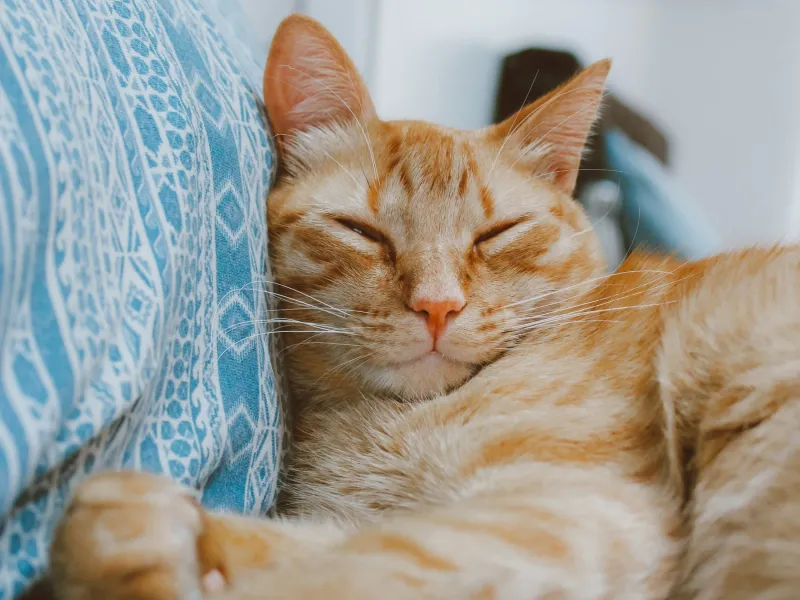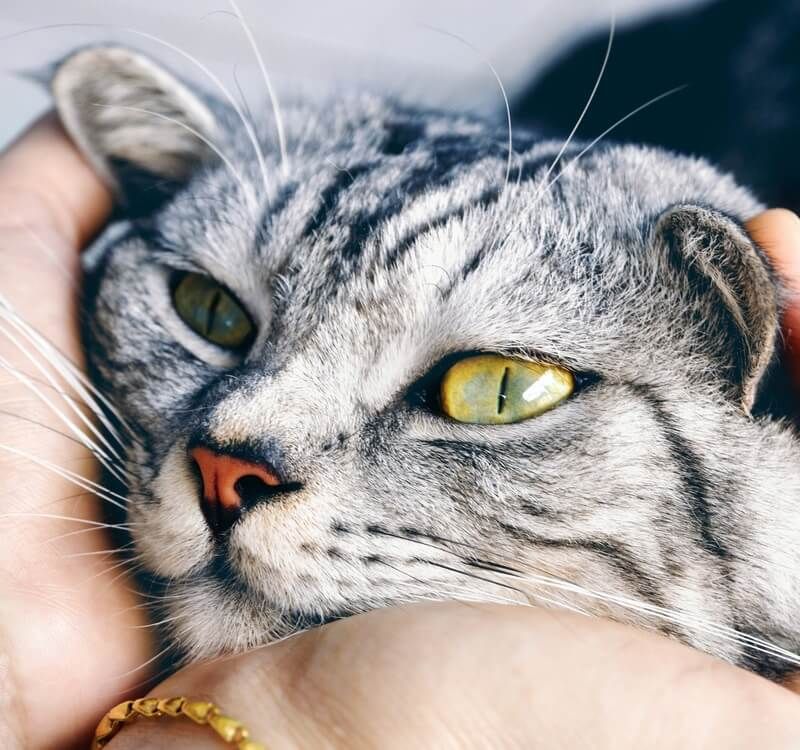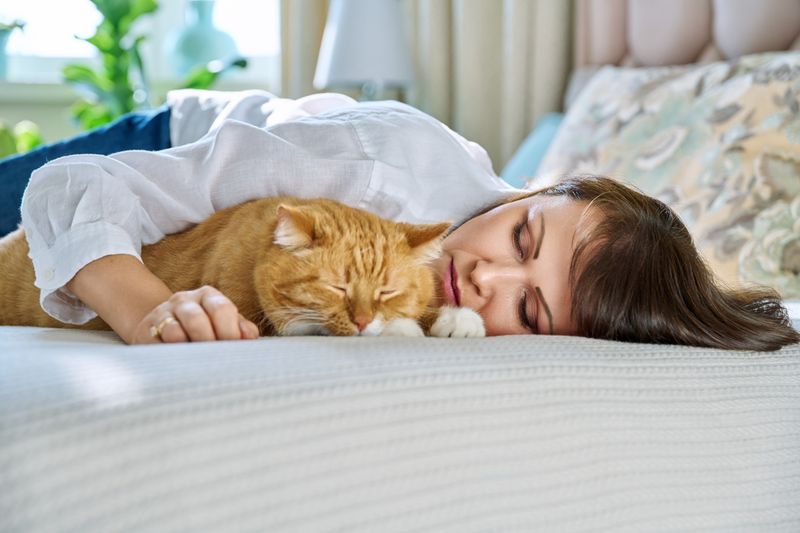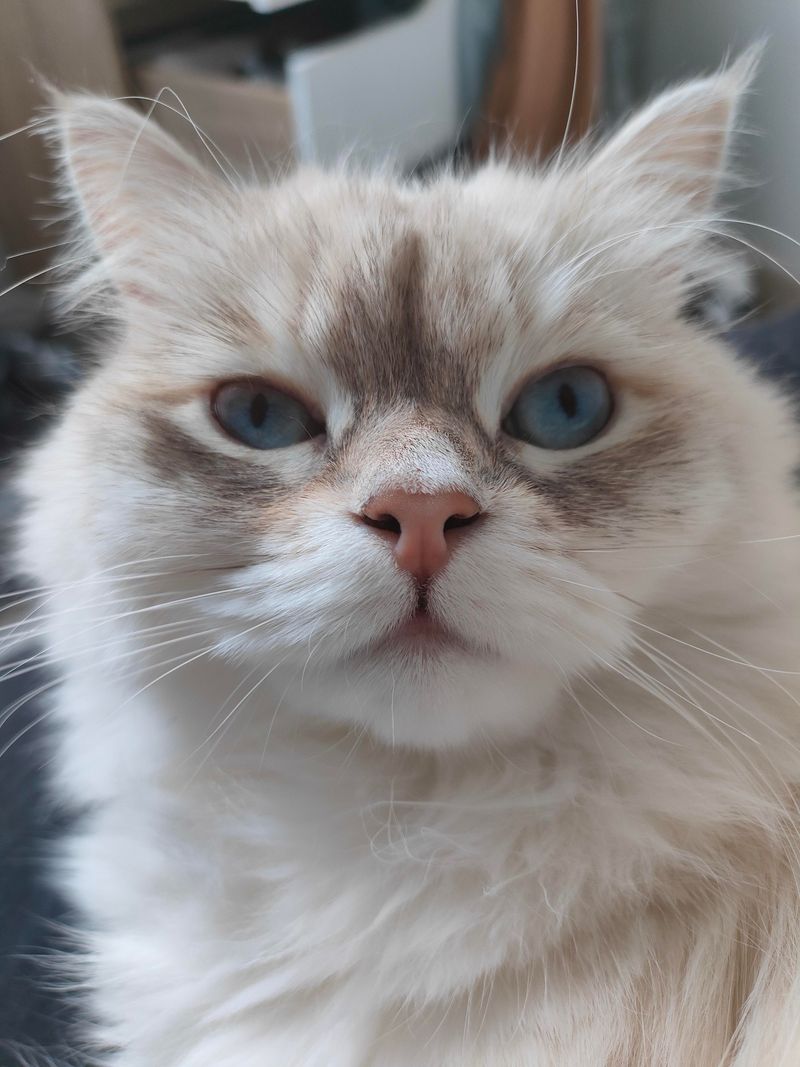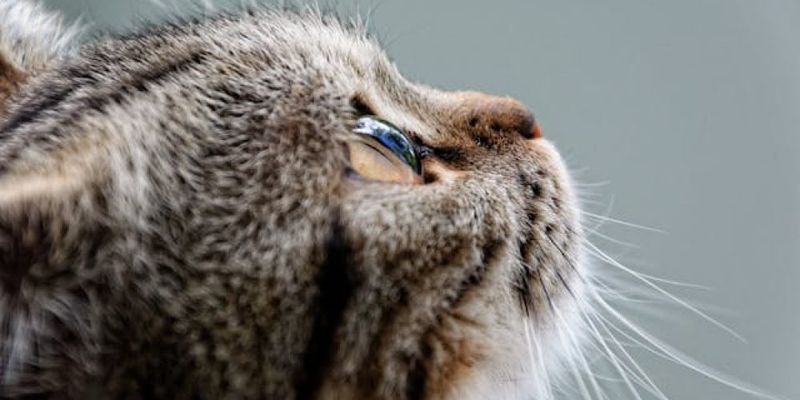📖 Table of Content:
- 1. They Appear When You’re Crying
- 2. Mirroring Your Energy Levels
- 3. Staying Close During Illness
- 4. Extra Affection After Bad Days
- 5. Reacting to Relationship Tensions
- 6. Purring When You’re Anxious
- 7. Sensing Pregnancy Before Announcement
- 8. Disrupted Sleep During Your Nightmares
- 9. Avoiding People You Dislike
- 10. Bringing Toys During Depression Episodes
Cats are often seen as independent creatures, but their behavior sometimes tells a different story. When a person feels sad or overwhelmed, some cats may respond in quiet, comforting ways. These responses can be easy to miss but may reveal a deeper emotional awareness.
Felines have keen senses and are highly observant of changes in their environment, including human behavior and body language. A shift in tone, posture, or routine can prompt certain reactions from a cat. Whether through extra cuddles, quiet companionship, or simply staying close, these reactions suggest emotional attunement.
Though not as outwardly expressive as dogs, many cats show an intuitive understanding of human moods. This gentle, understated empathy can be surprisingly powerful. Recognizing these signs can deepen the bond between cat and human, built not just on routine, but on quiet emotional connection.
1. They Appear When You’re Crying
Cats have an uncanny ability to materialize when tears start flowing. Your normally independent feline might suddenly jump onto your lap or press against you when you’re upset. This isn’t a coincidence – they sense your distress through body language and chemical changes.
Many cat owners report their pets becoming extra affectionate during emotional moments. Your cat might headbutt you gently or purr loudly against your chest. These comforting behaviors show that your cat recognizes something’s wrong.
Scientists believe cats evolved this sensitivity from their wild ancestors who needed to read emotional cues for survival. Your cat’s comfort-giving might be their way of checking if you’re okay.
2. Mirroring Your Energy Levels
Watch your cat when you’re bouncing with excitement or dragging with exhaustion – they often match your vibe. Energetic days might find your cat zooming around the house, initiating play, or bringing toys for interaction. Their whiskers forward, ears perked, they mirror your upbeat mood.
During your low-energy periods, many cats become notably calmer. They might choose to nap nearby rather than demand attention. This synchronization happens because cats are highly attuned to environmental changes, including your physical movements and vocal tones.
Mirroring strengthens your bond and helps cats predict what will happen next in their daily routine. It’s their way of staying connected to their favorite human.
3. Staying Close During Illness
When you’re sick in bed, your cat might transform into a furry nurse. Normally independent felines often refuse to leave their owner’s side during illness, sometimes even guarding the bedroom door. This protective behavior shows remarkable awareness of your vulnerable state.
Cats can detect subtle changes in your body temperature, breathing patterns, and scent when you’re unwell. Some will position themselves near the specific area that hurts – like curling up against your stomach during digestive issues or near your head during migraines.
The constant companionship isn’t just a coincidence. Your cat recognizes your need for extra support and responds with their version of caregiving – steady presence and soothing purrs that actually promote healing.
4. Extra Affection After Bad Days
Rough day at work? Your cat might greet you with unusual enthusiasm. Felines can detect stress hormones like cortisol lingering in your system. The cat who normally offers only occasional headbutts might suddenly become a purring machine, kneading your lap and rubbing against you persistently.
This behavior isn’t random – your cat is responding to chemical and behavioral cues that signal your emotional state. They often increase physical contact when they sense distress, offering their version of emotional support.
Research suggests this heightened affection serves an evolutionary purpose. Wild cats develop social bonding behaviors that strengthen during times of stress. Your bad day activates your cat’s instinct to reinforce your connection when you need it most.
5. Reacting to Relationship Tensions
Cats become noticeably different during household arguments. Your normally social kitty might hide under furniture, their ears flattened and pupils dilated. Others become unusually clingy or position themselves between arguing parties – a feline peacekeeper attempting to diffuse tension.
These reactions demonstrate remarkable emotional intelligence. Cats pick up on raised voices, tense body language, and the stress pheromones humans release during conflict. Their responses aren’t random but carefully calibrated to the emotional atmosphere.
After arguments subside, many cats perform “checking in” behaviors – approaching cautiously, offering gentle headbutts, or sitting nearby until normal household harmony returns. This pattern shows they’re monitoring not just the conflict but also the resolution process.
6. Purring When You’re Anxious
Your cat’s purr engine might kick into overdrive precisely when your anxiety peaks. This isn’t a mere coincidence – cats can detect subtle changes in your breathing, posture, and even scent when stress hormones flood your system. Their response is a natural healing mechanism.
Cat purrs vibrate at 25-150 Hertz, frequencies that scientifically promote tissue healing and stress reduction. The rhythmic sound naturally lowers blood pressure and releases endorphins in both cats and humans. Your feline friend essentially offers sound therapy.
Next time your cat intensifies purring during your anxious moments, they’re not just seeking attention. They’re providing a therapeutic intervention that evolved over thousands of years of human-feline companionship. This mutual benefit system strengthens your bond while calming both parties.
7. Sensing Pregnancy Before Announcement
Long before pregnancy tests confirm the news, your cat might already know. Formerly independent cats suddenly become velcro companions, often focusing attention on the abdomen area. This behavior stems from their extraordinary sensitivity to hormonal changes and body temperature fluctuations.
Pregnant cat owners frequently report their felines developing protective behaviors – sleeping against the stomach or becoming unusually alert to household visitors. These cats aren’t just being clingy; they’re responding to biological changes only their refined senses can detect.
The evolutionary advantage is clear – wild cats benefit from identifying pregnant members in their colony who might need protection. Your domestic cat maintains this ancient awareness, sometimes becoming a furry pregnancy announcement before you’ve shared the news with anyone else.
8. Disrupted Sleep During Your Nightmares
Your peaceful slumber suddenly turns frightening – and mysteriously, your cat appears at your side. Many cat owners report their felines waking them during nightmares, often placing paws on faces or meowing loudly until the bad dream ends. This remarkable intervention happens because cats monitor our sleep states.
During nightmares, humans exhibit micro-movements, changed breathing patterns, and release stress pheromones. Your cat’s heightened senses detect these subtle changes even while they themselves are sleeping nearby. Their alertness to your distress demonstrates their emotional connection.
The behavior has practical evolutionary roots – wild cats sleep in groups where disturbed sleep might signal danger. Your domestic cat maintains this protective instinct, serving as a furry guardian against your subconscious fears, proving their emotional attunement extends even into your dreamworld.
9. Avoiding People You Dislike
That friend who makes you uncomfortable? Your cat probably avoids them, too. Cats frequently display aversion to certain visitors while warming quickly to others – often matching their owner’s hidden feelings. This behavior showcases their remarkable ability to read subtle human interactions.
Cats observe microscopic changes in your body language, voice pitch, and facial expressions when interacting with different people. They also detect the chemical signatures of discomfort or anxiety you unconsciously emit around certain individuals.
Unlike dogs who might people-please regardless of their owner’s feelings, cats often make independent social judgments that curiously align with their human’s unspoken preferences. This selective socializing isn’t coincidental – your cat is essentially performing emotional security screening based on how different people affect your emotional state.
10. Bringing Toys During Depression Episodes
During your lowest moments, your cat might suddenly appear with their favorite toy in mouth. This gift-bringing behavior often increases during owner depression episodes. The timing isn’t random – your cat senses your emotional withdrawal and attempts to reengage you through play.
Scientists believe cats recognize the behavioral changes accompanying depression – reduced movement, different speech patterns, and diminished interaction. Their response shows remarkable emotional intelligence. By bringing toys, they’re essentially saying, “Let’s play – it might help.”
This behavior demonstrates that cats understand cause and effect in emotional contexts. They’ve learned that play activities change your emotional state and trigger positive responses. While not trained therapists, these intuitive felines often provide precisely the interaction needed during difficult emotional periods, showing they’re attuned to your mental well-being.
